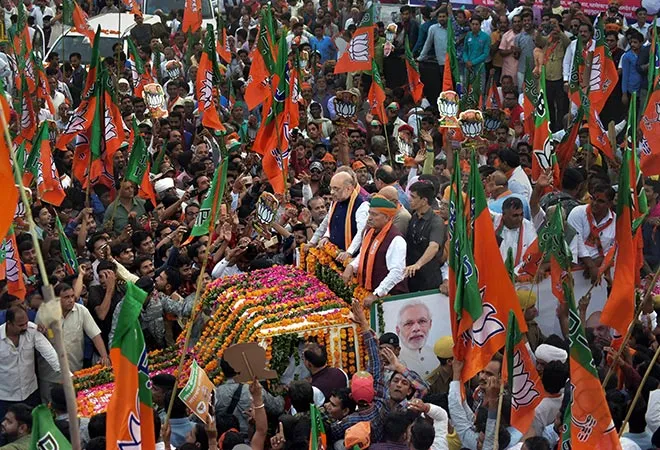-
CENTRES
Progammes & Centres
Location
Questioning the choices made by the government in terms of its response to the Pulwama terror strike is not 'questioning the forces' and thus unpatriotic

It is almost two decades since the World Trade Centre was brought down by terrorists, but the weeks and months that followed remain unusually clear in my memory. I was living in Boston at the time, from where the planes that al-Qaeda hijacked took off. I remember gasping when the second plane hit; I remember the stunned silence when the first tower fell; and I also remember how the United States changed in the time that followed. It gave in to anger. Even in the freest nation in the world, it became politically toxic to ask questions. Eighteen years on, America is living with the consequences of that failure: A political class and media that are thoroughly distrusted, and a continuing crisis in the Middle East. The forced uniformity of that period, the unwillingness to ask necessary questions of a US government that declared that patriotism required uniformity and obedience, has permanently scarred American politics and culture.
This is why we should be appalled that the current government has chosen to claim that questions of its many failures on the national security front — in controlling terrorism, in deterring Pakistan, and in managing Kashmir — are “anti-national”.
Questioning the choices made by the government in terms of its response to the Pulwama terror strike is not “questioning the forces” and thus unpatriotic. It is, instead, a necessity — the government, any government, must constantly be held accountable.
Indeed, if anyone is playing politics over national security it is the current ruling party, some prominent leaders of which have not concealed their hope that it will lead to an improvement in the Bharatiya Janata Party’s (BJP’s) electoral performance. The Prime Minister even addressed a political rally in Rajasthan in front of photographs of the CRPF jawans who were killed at Pulwama. The BJP’s official briefing accused the Congress president of giving comfort to the Jaish-e-Mohammed (JeM). The Prime Minister even linked counter-terror action to the controversy over the purchase of Rafale aircraft from France. The chief of the BJP in the national capital chose to campaign in army fatigues to which he was certainly not entitled. Anyone on WhatsApp will have noticed how their BJP-friendly contacts have sought to transform a national response to terror into one that is dependent upon the prime minister’s personality. In Rajasthan, the party is even selling sarees that have pictures of fighter jets, soldiers, and the Prime Minister on them.
But, said Home Minister Rajnath Singh, “It’s politicisation when someone asks how many terrorists were killed. That’s like raising doubts on your security forces.” In other words, it is not politicisation to say that under this government a strong response to terror has become the norm; but it is politicisation to ask how strong it was. It is not politicisation to campaign in military fatigues; but it is politicisation to wonder who will be held accountable for the intelligence failures that led to the death of young men wearing the uniform. It is not politicisation to claim that the government’s diplomacy has been so effective that the entire world stands with New Delhi; but asking why Beijing once again blocked a UN resolution against the JeM’s founder counts as giving aid and comfort to terrorists. This inconsistency would be amusing were it not so dangerous.
A forced uniformity on matters of national security is the greatest possible danger to national security. The opposition, the media and ordinary citizens must feel empowered to ask whether they are being protected properly.
If they are instead silenced, or voluntarily abandon the right to question at moments of crisis, then the eventual choices that are made will go unscrutinised — and, more often than not, will be the wrong ones. This is the climate of hysteria and silencing that led to the Iraq War.
The simple truth is that the government does indeed have a great deal of explaining to do. It needs to explain why the number of terrorist incidents in Kashmir has grown enormously under its watch. It needs to explain how the Pulwama attack came about, given it was one of considerable complexity and took place on the highest-security highway in India. It needs to explain how an airstrike that Pakistan retaliated to has changed the incentives facing those in the Pakistan military who have long supported terror. It needs to explain why it has not in five years built up the capabilities required to conduct effective, sub-conventional retaliation against cross-border terrorist architecture in Pakistan. And it has to explain what it got out of its fabled ‘Wuhan moment’ with Pakistan’s sole remaining patron, Beijing. These are questions that can and should be asked of any government, of any party. If these questions are not asked then we are failing in our duties as citizens. It is those who seek to silence such questions who will harm India’s national security.
This commentary originally appeared in Business Standard.
The views expressed above belong to the author(s). ORF research and analyses now available on Telegram! Click here to access our curated content — blogs, longforms and interviews.

Mihir Swarup Sharma is the Director Centre for Economy and Growth Programme at the Observer Research Foundation. He was trained as an economist and political scientist ...
Read More +